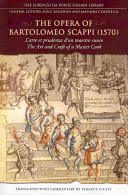

Most ebook files are in PDF format, so you can easily read them using various software such as Foxit Reader or directly on the Google Chrome browser.
Some ebook files are released by publishers in other formats such as .awz, .mobi, .epub, .fb2, etc. You may need to install specific software to read these formats on mobile/PC, such as Calibre.
Please read the tutorial at this link: https://ebookbell.com/faq
We offer FREE conversion to the popular formats you request; however, this may take some time. Therefore, right after payment, please email us, and we will try to provide the service as quickly as possible.
For some exceptional file formats or broken links (if any), please refrain from opening any disputes. Instead, email us first, and we will try to assist within a maximum of 6 hours.
EbookBell Team

5.0
90 reviewsBartolomeo Scappi (c. 1500-1577) was arguably the most famous chef of the Italian Renaissance. He oversaw the preparation of meals for several Cardinals and was such a master of his profession that he became the personal cook for two Popes. At the culmination of his prolific career he compiled the largest cookery treatise of the period to instruct an apprentice on the full craft of fine cuisine, its methods, ingredients, and recipes. Accompanying his book was a set of unique and precious engravings that show the ideal kitchen of his day, its operations and myriad utensils, and are exquisitely reproduced in this volume.
Scappi's Opera presents more than one thousand recipes along with menus that comprise up to a hundred dishes, while also commenting on a cook's responsibilities. Scappi also included a fascinating account of a pope's funeral and the complex procedures for feeding the cardinals during the ensuing conclave. His recipes inherit medieval culinary customs, but also anticipate modern Italian cookery with a segment of 230 recipes for pastry of plain and flaky dough (torte, ciambelle, pastizzi, crostate) and pasta (tortellini, tagliatelli, struffoli, ravioli, pizza).
Terence Scully presents the first English translation of the work. His aim is to make the recipes and the broad experience of this sophisticated papal cook accessible to a modern English audience interested in the culinary expertise and gastronomic refinement within the most civilized niche of Renaissance society.